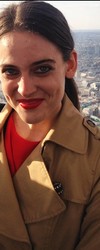Claudie Haigneré pictured last year. Photo via Wikicommons
Advertisement
Advertisement
Advertisement
What about microgravity? What's that like? "This is really astonishing because you cannot reproduce microgravity on Earth. This, for me, was one of the strongest moments: discovering the freedom of the body in microgravity. Slow movement, no weight, the possibility to use three dimension of space: it was really enjoyable. It's the revelation of something that you cannot imagine on Earth."After dedicating eleven years of her life to train for a single journey, did the reality of going into space match up to her imagination? "More! You can be trained, you can exchange with cosmonauts, but to feel microgravity, and to see the planets through the window? With your own eyes, your gaze, and your body floating? It's something that you can't imagine. The reality is better than the dream."We come back to reality—and that 11 percent. What advice would she give to a young girl in 2015 with dreams of space exploration?"Dare in your life. Don't wait to be perfect. Why not you?"Follow Kat on Twitter.Read on Broadly: You're Only Old Once: A Day at the Ms Senior America Pageant
